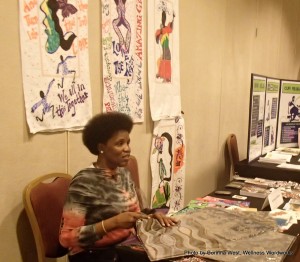I want to keep urging people to move toward the entrepreneurial approaches, because I think they are very powerful and not well understood or trusted in our community. I have chosen to build a business because I think it’s one of the best ways I can impact our world. After looking at the results of different types of advocacy work, this is the most sensitive pressure point I’ve found.

One of the books I am reading, called The Social Networking Business Plan, by David Silver, talks about the characteristics of entrepreneurs. This book and its sequel, Monetizing Social Networks, are about how to make money off our blogs and online communities. I am putting together a team of psychiatric survivor bloggers along with patient advocates from the physical illness survivor communities, like one of my favorites, Casey Quinlan, a cancer survivor and self proclaimed, “Literate, loud, opinionated iconoclast with a warm heart and a truth-telling tongue.” One of her joint ventures is Disruptive Women in Healthcare. At one point I was offering to buy 20 copies of the Monetizing Social Networks book to share among this blogging team, so let me know if this still appeals to people.
Are you an entrepreneur?
David Silver says:
Your community must solve pain. If it merely links person A to person B, you’re wasting your time and talent. You must be a pain solver to be an authentic, credible entrepreneur…. All of these entrepreneurs are complex, intense, determined, imaginative people who have faith in themselves, and whose energy is not sapped by pervasive anger, bitterness, or disappointment. Their workplaces have not been satisfying, or true, and have not rewarded what they most respect in themselves; the not-yet-active entrepreneurs have put in a lot of time and tried to contribute to their best. They have become dissatisfied and to some extent disillusioned. And they are not politically adept, so their pure commitment to human potential irritates rather than inspires management, making it impossible for hem to maneuver budgets and forums of influence the way others can to make the organizational dynamics work for, and not against, them.
Nevertheless, though the resent the system, they proceed despite their disillusion and go on to create their own reality; thus true entrepreneurs do not feel victimized. The do not plot and plan retaliation. Rather, they accept that these organizations will not provide places to do what they want to do and believe should be done, and they decide to create such an organization of their own.
Acceptance of reality brings determination, not depression, distraction, or diffuse, flailing attempts to get even, to show up their opponents…Acceptance brings dedication to building their own strengths rather than do demonstrating the weakness of the organization. They know that it is difficult to disrupt corporate power, so they decide to establish their own disrupter and pain solver.
The personal goals and needs that have been emerging as the strongest forces soon take over to govern their behavior. They direct their psychic and creative energy into building on the emotional self-sufficiency that has been slowly, steadily taking hold. They do this with an ease that astounds people who know or hear about them.
The creative intelligence they brought to their employers’ businesses is now directed toward designing social networks and positioning them for the marketplace….. They are getting ready to build place in the sun, not build empires. They are planning for, and are after, self-reliance, a quality controlled platform for creative output. A niche is found. It starts to feel that harmony is adhering to melody. They talk about building an organization where people will not get lost; where creativity will be rewarded, where salaries and benefits will be just; where participative management will be the rule, not the exception. To the amazement of people who were not able to turn anger, energy, disappointment, and dissatisfaction into focused personal directedness, they begin to experience intense pleasure. The undercurrent of basic optimism and trust in their professional power, the certainty that has always existed that their expertise in their field is unequaled, governs a clear decision to be on their own and succeed….
I don’t know about you, but this describes my work history to a T. When I read it to my husband, he said, “That guy has been reading your mail.” I love being my own boss. I love what I do. I’ve shaped my passions and interests around my work. Right now, everything I do is both work and play. Come join me.
How Entrepreneurs are Advocates:
Beverly Schwartz from the Ashoka Foundation, works with the biggest network of social entrepreneurs in the world. A social entrepreneur is a person who makes change while they are making change. The goal of their organization is to do well as well as make a profit. She has written a book called, Rippling: How Social Entrepreneurs Spread Innovation Throughout the World. She says,
Today, after three centuries of tectonic acceleration, we are, I believe, already in the transformation zone of as big a shift as we have ever seen. The rate of change is accelerating exponentially. So is the growth in the number and the skills of the people actively causing change, and the connections between them. It is clear where we are headed.
In a world where everything changes, and where every change bumps many other elements, causing them to change, the old social order is fast failing. Organizations in which a few people direct everyone else may have worked when the group and its members learned a skill and performed repetitive tasks year after year. This world of invisible peasantry will increasingly not be able to cope.
What is needed to contribute value – and to be able to compete and survive – is instead a fluid, quick, and often changing team of teams….But a team can only be a team if everyone is a player. And, in a world increasingly defined by change, being a player increasingly means one must be able to imagine and contribute to change. Anyone who is not a changemaker will be able to contribute very little…What is needed now more than anything else is for society to go through what the Ashoka foundation calls “the awareness tipping zone” very, very soon. Once many people see the change that is coming, and what it means for them, they begin to act. And when they see one another acting, it makes conversation and action safer and increasingly unavoidable.
How I Became a Mental Health Social Entrepreneur:
I’ve been an entrepreneur since I was six. One of my mom’s favorite stories is when she left me to play in a (small town) park during one of her college classes when I was six. She came out and I had braided strands of grass into little creations that I was selling to everyone that walked by. By the time she came back, I had earned enough money to buy a slice of carrot cake from a restaurant.
I also competed on the Olympic Judo Team, and had to pay much of my own way to all the junior and senior competitions I entered on way up the ladder. I found a wholesale candy bar vendor and spent almost two years of high school hawking candy bars to my classmates and having the discipline not to eat my own stock. I earned enough money with this that I had to file taxes as a freshman in high school.

I am also an artist. The many different professional development programs I have completed through the Charlotte Street Foundation and Arts KC have taught me that all artists are entrepreneurs. The Artist Inc. program is now available online. I have sold over $7,000 of poetry CD’s, collages, and books despite the downturn in the economy. At the same time, I’ve been working to develop a social entrepreneurship approach to mental health care that would connect people who are struggling with those who know a solid, proven way out.
I’ve realized how essential it is to provide a complete menu of solutions for emotional distress and to find a sustainable funding source. By merging many of our nation’s most effective peer support programs into a powerful online marketplace, I’ve found the answer that can help move my brothers and sisters with mental health labels back into productive and satisfying lives. It’s been the answer for me as I’ve learned how to finally, for once in my life, make a boss happy. My biggest trauma issue has been that no matter how hard I work, how creative and productive I am, I’ve always been fired.
Many people have asked me how to do what I’m doing. I always tell them to find the Small Business Development Center that is in almost every single city in the US. This center usually has a selection of free classes and programs to help people on their way. KC Sourcelink and the Kauffman Foundation from Kansas City are great resources that also have some national connections.
There is no day like today to start working on your dream.















I appreciate the positive can-do attitude. I also think that reform would better come from outside the mental health system than within. I don’t see any serious self-reflection from within; besides, when they make that much money selling illness what is really the problem? Psych survivors need a structured path to wellness (a community that would support them living an undrugged life) that involves using their talents instead of thinking/talking about their supposed deficits. There are some great ideas here that I hope grow and spread to other towns outside of Kansas City.
Complaining about real actual abuses of power and true legimatized/institutionalized deception has its proper place and can be used constructively to promote change for us all. But there is certainly more to being a survivor than that…
Love your work Corinna!
Report comment
Corinna, I just happened upon your post as I was reacquainting myself with Bob’s amazing site. Your words really struck a chord within me, and I want to thank you for inspiring me!
Though I don’t consider myself to be either a psychiatric survivor nor a member of the physical illness survivor community, I am most definitely in the clan of “Disruptive Women” in Mental healthcare! (BTW – I adore the term!)
I’ve emerged from that initial phase of “linking A to B” I find that to be a perfect description of how I started out; maybe it’s a natural step one takes when they know they have to do SOMETHING, but can’t quite grasp the full knowledge of what that something is… Anyway, I eagerly anticipate the use of your resources as I take that transitional leap from treading water to steering my own ship as captain! Ahoy, Mate!
Report comment